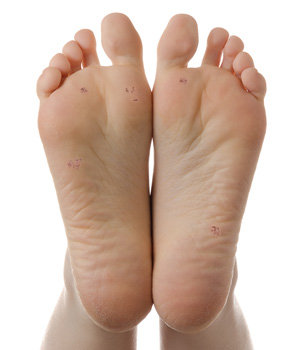Plantar Warts
 Plantar warts are noncancerous skin growths on the soles of your feet caused by the human papillomavirus (HPV), which enters your body through tiny cuts, breaks or other vulnerable sites on the skin of your feet.
Plantar warts are noncancerous skin growths on the soles of your feet caused by the human papillomavirus (HPV), which enters your body through tiny cuts, breaks or other vulnerable sites on the skin of your feet.
Plantar warts often develop beneath pressure points in your feet, such as the heels or balls of your feet. This pressure also may cause a plantar wart to grow inward beneath a hard, thick layer of skin (callus).
Most plantar warts aren’t a serious health concern and may not require treatment. However, plantar warts can be bothersome or painful. If self-care treatments for plantar warts don’t work, you may need to see your doctor to have them removed.
Signs and symptoms of plantar warts include:
- Small, fleshy, grainy lesions, or growths, on the soles of your feet
- Hard, thickened skin (callus) over a well-defined “spot” on the skin, where a wart has grown inwards
- Black pinpoints, which are commonly called “wart seeds” but are actually small, clotted blood vessels
- Lesions that interrupt the normal lines and ridges in the skin of your feet
- Pain or tenderness when walking or standing
See your doctor if:
- The lesions are painful or change in appearance or color
- The warts persist, multiply or recur, despite home treatment
- The warts interfere with your activities
- You have diabetes or nerve damage (neuropathy) in your feet — in which case, you should not use at-home treatments
- You have a weakened immune system because of HIV/AIDS, immune-suppressing drugs or other immune system disorders
- You have any doubt that the lesion is a wart
In these cases, your doctor may prescribe a closely monitored treatment plan or consider a different diagnosis.
